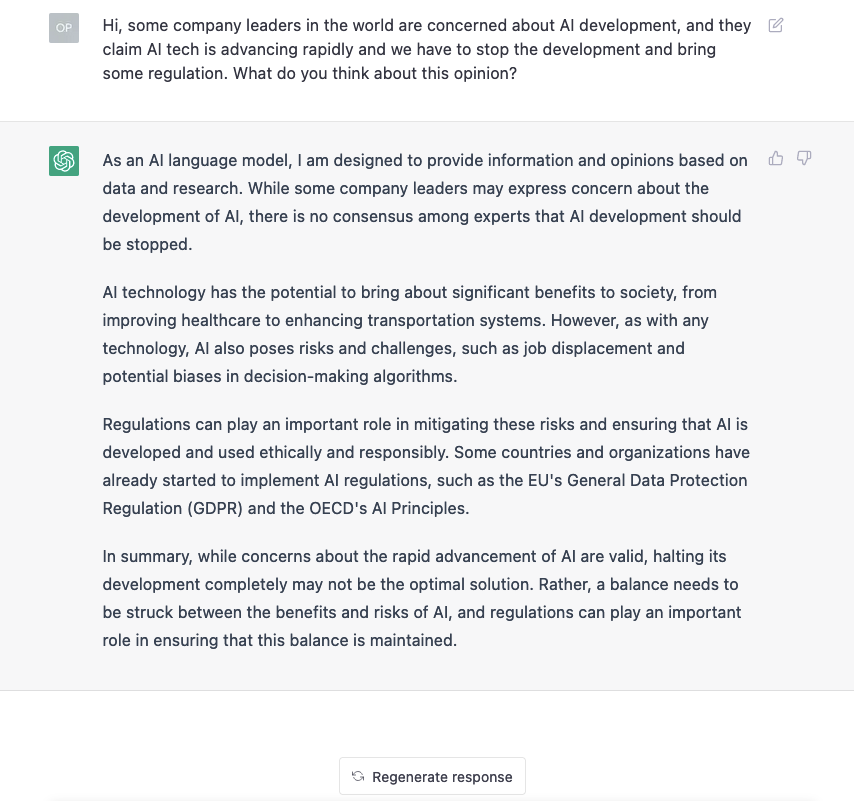Is AI development a threat to humanity?
-
I saw this article earlier, and wanted to share it here in order to start a discussion around AI in general.
As you might already know, I’m not a huge fan of AI and a while ago now, I wrote the below article
Obviously, my views around this specific subject are mine, but I’m keen to understand what others think.
Let’s discuss

-
I saw this article earlier, and wanted to share it here in order to start a discussion around AI in general.
As you might already know, I’m not a huge fan of AI and a while ago now, I wrote the below article
https://sudonix.com/topic/138/ai-a-new-dawn-or-the-demise-of-humanity?_=1680120970459
Obviously, my views around this specific subject are mine, but I’m keen to understand what others think.
Let’s discuss

@phenomlab what about this simple fix?
if (going to turn evil)
{don’t}
else
{still don’t} -
I saw this article earlier, and wanted to share it here in order to start a discussion around AI in general.
As you might already know, I’m not a huge fan of AI and a while ago now, I wrote the below article
https://sudonix.com/topic/138/ai-a-new-dawn-or-the-demise-of-humanity?_=1680120970459
Obviously, my views around this specific subject are mine, but I’m keen to understand what others think.
Let’s discuss

jokes aside… I don’t think anything serious will be done because h**o sapiens sapiens is a very irrational and greedy creature. as long as people are making money with this (which, of course, is the case), there will be support somewhere, so people will not ban it in order to not stay behind… climate change is a more serious threat to humanity, but look what the governments are doing to prevent it

There is also good in AI development, we have already talked before how chatgpt can be used for personal productivity. So, why ban it completely… I am pretty sure “experts” in governments will not appreciate good or bad sides of AI development. There is much more incentive in companies and universities for AI development, compared to working in the government. I can see machine learning PhDs are getting more and more popular, so I am pretty sure there will be more intelligent people who will want to put effort into AI development. So, they will be against this. Elon Musk being one of the signers does not look good to many people, since he is not a popular (liked) figure anymore

Additionally, they say in the news:
“Powerful AI systems should be developed only once we are confident that their effects will be positive and their risks will be manageable.”
How can we be certain of this before doing it?
-
@phenomlab what about this simple fix?
if (going to turn evil)
{don’t}
else
{still don’t}@crazycells said in Is AI development a threat to humanity?:
if (going to turn evil)
{don’t}
else
{still don’t}Shouldn’t that be
if (turningevil) { var evil = "Don't do that - you're evil"; alert(evil); } elseif (!turningevil) { var good = "Thanks for staying kind to humanity"; alert(good); } else { var dunno = "You don't know what you're doing it seems"; alert(dunno); } 
-
jokes aside… I don’t think anything serious will be done because h**o sapiens sapiens is a very irrational and greedy creature. as long as people are making money with this (which, of course, is the case), there will be support somewhere, so people will not ban it in order to not stay behind… climate change is a more serious threat to humanity, but look what the governments are doing to prevent it

There is also good in AI development, we have already talked before how chatgpt can be used for personal productivity. So, why ban it completely… I am pretty sure “experts” in governments will not appreciate good or bad sides of AI development. There is much more incentive in companies and universities for AI development, compared to working in the government. I can see machine learning PhDs are getting more and more popular, so I am pretty sure there will be more intelligent people who will want to put effort into AI development. So, they will be against this. Elon Musk being one of the signers does not look good to many people, since he is not a popular (liked) figure anymore

Additionally, they say in the news:
“Powerful AI systems should be developed only once we are confident that their effects will be positive and their risks will be manageable.”
How can we be certain of this before doing it?
@crazycells said in Is AI development a threat to humanity?:
jokes aside… I don’t think anything serious will be done because h**o sapiens sapiens is a very irrational and greedy creature. as long as people are making money with this (which, of course, is the case), there will be support somewhere, so people will not ban it in order to not stay behind… climate change is a more serious threat to humanity, but look what the governments are doing to prevent it
Amen to that. You’re right on the money there. Climate Change isn’t being taken seriously, and nowhere near enough is being done. Man has no concept of the fact that you cannot keep taking and expect to give nothing back.
@crazycells said in Is AI development a threat to humanity?:
There is also good in AI development, we have already talked before how chatgpt can be used for personal productivity. So, why ban it completely… I am pretty sure “experts” in governments will not appreciate good or bad sides of AI development. There is much more incentive in companies and universities for AI development, compared to working in the government. I can see machine learning PhDs are getting more and more popular, so I am pretty sure there will be more intelligent people who will want to put effort into AI development.
Good points. I guess the issue here is the “good AI” being leveraged for nefarious purposes - as is ChatGPT already.
@crazycells said in Is AI development a threat to humanity?:
Additionally, they say in the news:
“Powerful AI systems should be developed only once we are confident that their effects will be positive and their risks will be manageable.”
How can we be certain of this before doing it?
Test it on Elon Musk?

-
An interesting intersect
https://news.sky.com/story/is-ai-becoming-too-clever-12845111 -
@crazycells said in Is AI development a threat to humanity?:
jokes aside… I don’t think anything serious will be done because h**o sapiens sapiens is a very irrational and greedy creature. as long as people are making money with this (which, of course, is the case), there will be support somewhere, so people will not ban it in order to not stay behind… climate change is a more serious threat to humanity, but look what the governments are doing to prevent it
Amen to that. You’re right on the money there. Climate Change isn’t being taken seriously, and nowhere near enough is being done. Man has no concept of the fact that you cannot keep taking and expect to give nothing back.
@crazycells said in Is AI development a threat to humanity?:
There is also good in AI development, we have already talked before how chatgpt can be used for personal productivity. So, why ban it completely… I am pretty sure “experts” in governments will not appreciate good or bad sides of AI development. There is much more incentive in companies and universities for AI development, compared to working in the government. I can see machine learning PhDs are getting more and more popular, so I am pretty sure there will be more intelligent people who will want to put effort into AI development.
Good points. I guess the issue here is the “good AI” being leveraged for nefarious purposes - as is ChatGPT already.
@crazycells said in Is AI development a threat to humanity?:
Additionally, they say in the news:
“Powerful AI systems should be developed only once we are confident that their effects will be positive and their risks will be manageable.”
How can we be certain of this before doing it?
Test it on Elon Musk?

@phenomlab said in Is AI development a threat to humanity?:
Test it on Elon Musk?
I am signing this petition

-
It is also interesting that company leaders rather than “scientists” are going forward with this.
It looks very suspicious to me. For climate change petitions, we have many scientists with no “conflict of interest”, it is genuine, sincere and rightful. But when it is about AI, we have many CEOs that demand “more regulation”… Clearly, they all have a conflict of interest with this, it looks more like “we have already here, so let’s prevent others from reaching us with more regulation” kind of move…
I wonder your opinion… am I only seeing the bad side and ignoring the good, or am I right to suspect this…
-
@phenomlab said in Is AI development a threat to humanity?:
Test it on Elon Musk?
I am signing this petition

@crazycells Join the queue !!
-
It is also interesting that company leaders rather than “scientists” are going forward with this.
It looks very suspicious to me. For climate change petitions, we have many scientists with no “conflict of interest”, it is genuine, sincere and rightful. But when it is about AI, we have many CEOs that demand “more regulation”… Clearly, they all have a conflict of interest with this, it looks more like “we have already here, so let’s prevent others from reaching us with more regulation” kind of move…
I wonder your opinion… am I only seeing the bad side and ignoring the good, or am I right to suspect this…
@crazycells said in Is AI development a threat to humanity?:
It is also interesting that company leaders rather than “scientists” are going forward with this.
It looks very suspicious to me. For climate change petitions, we have many scientists with no “conflict of interest”, it is genuine, sincere and rightful. But when it is about AI, we have many CEOs that demand “more regulation”… Clearly, they all have a conflict of interest with this, it looks more like “we have already here, so let’s prevent others from reaching us with more regulation” kind of move…
I wonder your opinion… am I only seeing the bad side and ignoring the good, or am I right to suspect this…No, I agree with you. It just goes to show you that this is being lead by corporate organisations as a way primarily of making money rather than enriching lives.
The “more regulation” side is nothing new. We had the same in the UK when the electronic cigarette was introduced, and then e-liquids which you could buy cheaply online. The tobacco industry screamed from the rooftops about regulation, but only because they were losing a significant market share to these new boutiques popping up all over the place. They have no conscience about the carcinogenic risks of their own products - they just want you to stop buying cheaper (and cleaner) alternatives.
Same applies to the energy industry. Nuclear is off the table in some countries because the energy markets are where they make their money - think Oil, Gas, etc…
By their so called “regulation” they can make the market much smaller and only accessible to big tech companies who can afford to enter it with their huge R&D budgets.
-
-
@crazycells said in Is AI development a threat to humanity?:
It is also interesting that company leaders rather than “scientists” are going forward with this.
It looks very suspicious to me. For climate change petitions, we have many scientists with no “conflict of interest”, it is genuine, sincere and rightful. But when it is about AI, we have many CEOs that demand “more regulation”… Clearly, they all have a conflict of interest with this, it looks more like “we have already here, so let’s prevent others from reaching us with more regulation” kind of move…
I wonder your opinion… am I only seeing the bad side and ignoring the good, or am I right to suspect this…No, I agree with you. It just goes to show you that this is being lead by corporate organisations as a way primarily of making money rather than enriching lives.
The “more regulation” side is nothing new. We had the same in the UK when the electronic cigarette was introduced, and then e-liquids which you could buy cheaply online. The tobacco industry screamed from the rooftops about regulation, but only because they were losing a significant market share to these new boutiques popping up all over the place. They have no conscience about the carcinogenic risks of their own products - they just want you to stop buying cheaper (and cleaner) alternatives.
Same applies to the energy industry. Nuclear is off the table in some countries because the energy markets are where they make their money - think Oil, Gas, etc…
By their so called “regulation” they can make the market much smaller and only accessible to big tech companies who can afford to enter it with their huge R&D budgets.
@phenomlab said in Is AI development a threat to humanity?:
Same applies to the energy industry. Nuclear is off the table in some countries because the energy markets are where they make their money - think Oil, Gas, etc…
Yeap, I totally agree. I am still angry about nuclear energy. Nuclear energy is the greenest and by far the most efficient one. But with bad media coverage, many people are against it and avoiding it as if it is leprosy.
It is very similar to plane crashes. Hundreds of people are dying because of car accidents every day, but no one really cares, but when a rare plane accident happens, the media will be onto it for several weeks. They are brainwashing us to accept one of them as “acceptable” and the other one as “unacceptable”…
-
-
@phenomlab from the article on the link…
But to worry about big changes is part of human nature. Clerics worried the printing press would make monks lazy in the 15th Century. Weavers smashed up machines in the 19th Century fearing they’d lose their livelihood.
Even your author snubbed the offer of a mobile phone in 1997 convinced they’d only be for “show-offs” and would never really catch on.
-
@phenomlab from the article on the link…
But to worry about big changes is part of human nature. Clerics worried the printing press would make monks lazy in the 15th Century. Weavers smashed up machines in the 19th Century fearing they’d lose their livelihood.
Even your author snubbed the offer of a mobile phone in 1997 convinced they’d only be for “show-offs” and would never really catch on.
@crazycells The comment
Even your author snubbed the offer of a mobile phone in 1997 convinced they’d only be for “show-offs” and would never really catch on.
Is worrying to say the least. How can you possibly comment on subject matter such as AI when you snubbed the concept of a mobile phone in 1997? Typical BBC.
-
@crazycells this one made me laugh - talk about using AI to it’s intended full potential
-
@crazycells this one made me laugh - talk about using AI to it’s intended full potential
https://www.bbc.co.uk/news/uk-england-york-north-yorkshire-65126772
@phenomlab lol yeap, very smart… I read it and immediately ask the same question to ChatGPT and saved the letter sample

I might use it in the future.
Hello! It looks like you're interested in this conversation, but you don't have an account yet.
Getting fed up of having to scroll through the same posts each visit? When you register for an account, you'll always come back to exactly where you were before, and choose to be notified of new replies (ether email, or push notification). You'll also be able to save bookmarks, use reactions, and upvote to show your appreciation to other community members.
With your input, this post could be even better 💗
RegisterLog in



